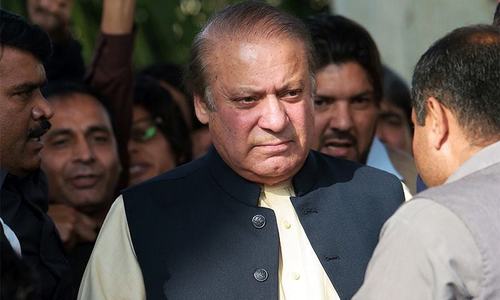Former prime minister Nawaz Sharif was given the "benefit of doubt" in the Flagship Investments corruption reference over lack of evidence, it emerged on Monday after the detailed verdict was issued by an accountability court.
On December 24, Judge Mohammad Arshad Malik announced in the court that “he didn’t find anything against Nawaz Sharif in reference No 18 [Flagship Investment] and the accused is acquitted in this case”.
The three-time former prime minister, however, was handed seven years in jail and multiple fines after being found guilty in the Al-Azizia/Hill Metal Establishment (HME) case. He is currently serving his sentence at Kot Lakhpat jail in Lahore.
The detailed judgment in the Flagship reference, penned by Justice Malik, said that the possibility of Sharif being the real beneficial owner of Flagship Investments Ltd "cannot be ruled out".
The court cited a 2015 judgement and reiterated that for the charged person to be saddled with liability, the prosecution has to establish its case "beyond all reasonable doubts".
The judge further said that "based on available evidence, it is inclined to extend the benefit of the doubt" to the PML-N leader.
The judge, however, noted that the co-accused, Sharif's sons Hassan and Hussain Nawaz, "have already been declared as proclaimed offenders" and ordered that their "perpetual non-bailable" arrest warrants be issued.
Furthermore, Judge Malik stated that the possibility of Sharif having supplied Hassan with funds to the tune of £705,071 from his "undeclared, secret wealth and assets held outside Pakistan cannot be ruled out completely" but noted that "there is insufficient evidence to safely reach the conclusion".
The detailed verdict has been released exactly a week after the acquittal. While the verdict in case of a conviction is handed over to the accused at the time of its pronouncement, the judgement in case of acquittal is provided to him/her on request.
NAB to file appeal
The prosecuting agency, NAB, has already decided that it will file an appeal against the judgement in the Flagship reference. The decision was taken at a meeting presided over by NAB chairman retired Justice Javed Iqbal soon after the verdict’s announcement in the court.
Under the National Accountability Ordinance (NAO), an appeal against the verdict of the accountability court may be filed within 10 days of receipt of a written order of the court.
Sources in the prosecuting agency said that evidence in the two references — Al-Azizia/Hill Metal Establishment and Flagship Investment — were identical.
The Supreme Court in its verdict of April 20, 2017 had ordered the formation of a joint investigation team (JIT) headed by an additional director general of the Federal Investigation Agency and asked it to answer multiple questions including those relating to the setting up of the Al-Azizia/Hill Metal Establishment (HME) and Flagship Investment.
The apex court had also asked the JIT to probe into any transactions from the Gulf Steel Mills (GSM) through which the Sharif family had allegedly acquired the Avenfield properties, HME and Flagship Investment as well as other companies.
Subsequently, the alleged money trail of the Sharif family started from AED12 million from GSM which was invested with a Qatari family and drawn for Avenfield properties, HME and Flagship Investment.
In its report submitted to the Supreme Court in July 2017, the JIT rejected the said money trail. Accountability Judge Mohammad Bashir in the verdict in the Avenfield properties reference and Judge Arshad Malik both remained unconvinced about the financial source from which the Sharif family was said to have acquired properties and started businesses in the United Kingdom and Saudi Arabia.
The difference between the HME and Flagship Investment references was that in the former, the prosecution has brought on judicial record that Sharif received US$10.2 million and 1.26m euros from the HME whereas no such amount was remitted in the name of Sharif from the Flagship Investment and other companies owned by Hassan Nawaz in the UK.















































